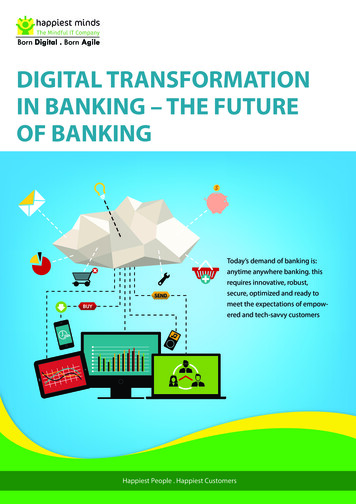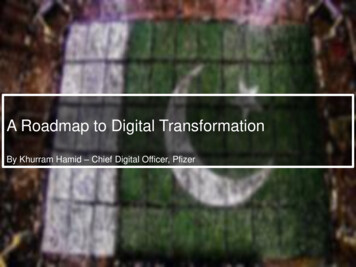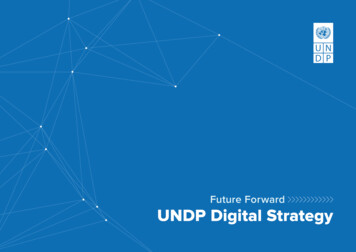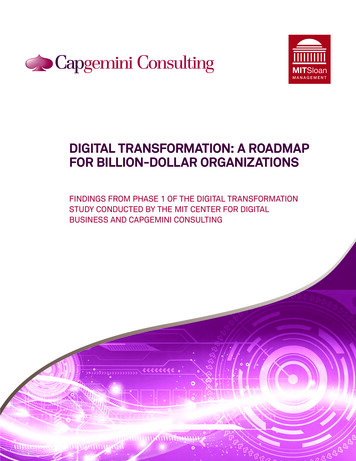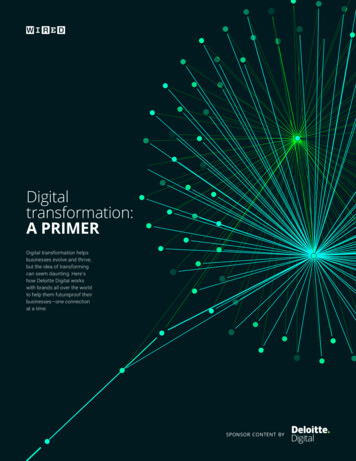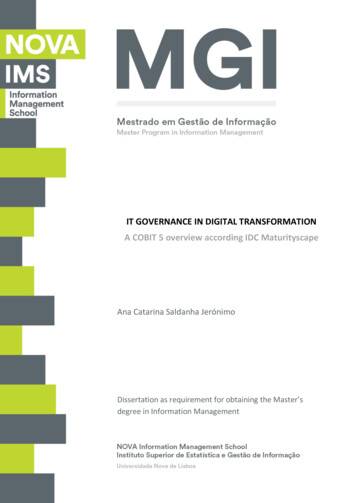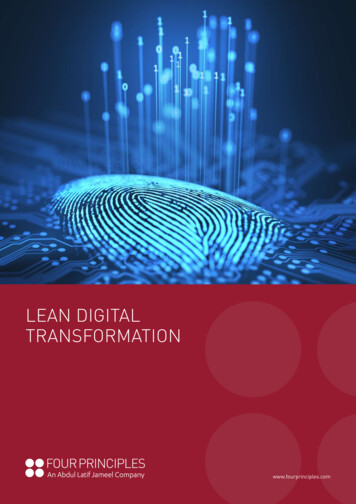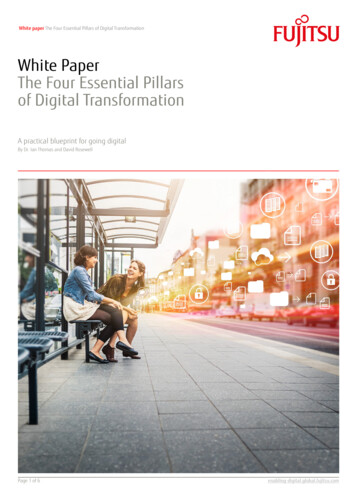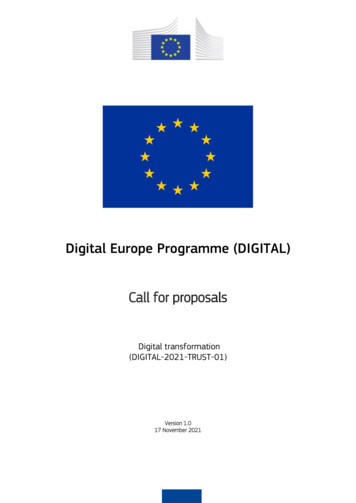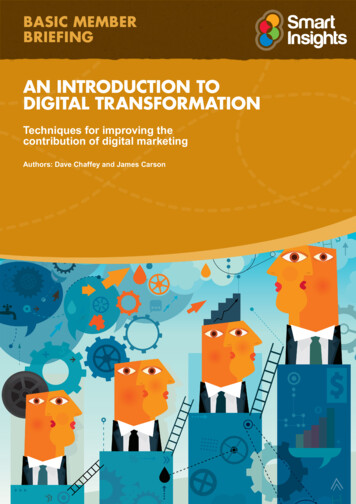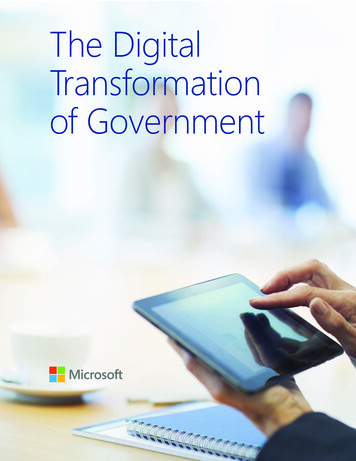
Transcription
The DigitalTransformationof Government
Contents3The challenge of government digitaltransformation4The technology revolution providing newopportunities for digital government5The Microsoft roadmap to achieving digitaltransformation6Improving the citizen experience ofgovernment8The next generation of government workerproductivity10Improving operating efficiency throughtransformation12Transforming government effectivenessthrough deeper data insights14Security and compliance for governmenttransformation15Take your digital transformation to the nextlevel with Microsoft
The challenge ofgovernment digitaltransformationGovernments are continually under pressureto deliver greater value to their citizens,businesses and communities.Many governments find their financialand human resources are under new andincreasing pressures from changing demandsand an aging and diverse population.Some governments, particularly in cities,are experiencing unprecedented growth inpopulation as people migrate to find newand better opportunities for jobs, healthand education. These challenges of deliveryare compounded by citizens demandingbetter, more accessible engagement withgovernments at every level with theirexpectations being fuelled by the commercialsector experiences and social media.So how can cloud technology helpgovernments find solutions to challenges andbetter meet citizen expectations?While governments have been seekingsolutions to these challenges, some havebeen taking advantage of the rapid advancesin cloud and mobile computing, big dataand analytics, to begin to change the faceof their government. These forward thinkingagencies are looking to leave behind oldmanual legacy processes, disparate systems,and paper-based methods. They areworking towards a digital future enabled bytechnology as the catalyst for new businessand government models, services and citizenexperiences.In this e-book we will explore some of thekey features of the technology revolutionthat is enabling digital transformation forgovernments, and how those agenciesare solving common challenges related tocitizen engagement, worker productivity, costefficiency and service innovation.3
The technologyrevolution providingnew opportunities fordigital governmentMany have compared the recent advances incloud and mobile computing technology as a“Fourth Industrial Revolution,” characterizedby cost effective access to unprecedentedprocessing power, storage, availability,scalability and security, plus the ability toreadily analyse and gain insights to vastquantities of data.These new insights help governments tobetter understand the performance ofexisting service delivery, indicating waysto improve them and opportunities toprovide new services that improve thecitizen experience. In the past, this level ofcomputing capability was only available tothe largest and wealthiest of organizationsand agencies but is now in use by millionsof citizens every day through their mobiledevices.4Technology has become omnipresentin society, and our ability to understandand embrace it represents an enormousopportunity. It’s through this lensthat Microsoft is focusing a missionfor government: to empower digitaltransformation that builds economic growth,broadens social inclusion, drives goodgovernance and achieves better citizenoutcomes.One opportunity presented by this newage of computing is the potential forgovernments to operate more like a digitalservice company, optimizing operations,transforming services, empoweringemployees and engaging their citizensin greater depth and volume. The rapidadoption of cloud, data analytics, socialmedia and mobility are increasing the paceof change and driving demand for innovationin government services. These technologymegatrends and the proliferation of data areresetting how governments operate, fromhow they make decisions and create policybased on data analytics, to how they fulfilthe expectations of citizens and businessesthrough multiple delivery channels.Innovative governments are now embracingcloud technology; not only the web and appsbut the Internet of Things (IoT) and sensors,machine learning, digital agents, bots andspeech recognition tools to better analyzeand understand the data output. In thisway, governments are able to deliver deeplycontextual, personalized and consistentexperiences to citizens by harnessing toolsthat allow them to increase engagement andcost efficiency.The following pages will draw on theexperiences of real governments whohave embraced many stages of digitaltransformation and are learning more aboutthe benefits they can deliver to citizens andgovernment workers.
The Microsoftroadmap to achievingdigital transformationas a team to develop strategies - withoutsacrificing security and compliance.Microsoft has identified four key focus areasas the core drivers for a digital governmenttransformation roadmap. These pillarshelp describe the tangible benefits oftransformation putting them into the contextof digital government.Optimize government operationsTrusted cloud services and solutions canhelp optimize government operations topromote cost and operating efficiencies.Microsoft is focused on delivering a flexible,integrated and trustworthy choice of cloudand productivity solutions for government,helping to address all the key transformationchallenges agencies may face to deliverimproved citizen outcomes.Engage your citizensGovernments can now engage with citizensat scale through connected mobile servicesto better understand citizen needs andincrease satisfaction and participation ingovernment. This enables governments tosuccessfully enact mobile citizen services andTransform your servicesWith digital transformation, an agency nowhas access to vast quantities of data fromprocesses and the Internet of Thing toproduce actionable analysis, insights andbetter decision making that can improveoperations and indicate new serviceinteract with citizens on a security enhanced,mobile, government-grade platform. And inturn, the Microsoft cloud platform helps driveincreased productivity, protect governmentdata from threats and reduce managementcosts.opportunities. Data can now grow in value asgovernments take advantage of self-servicedata analysis tools that enable anyone towork with virtually any type of data in newand insightful ways.Empower government workersGovernment employees are now able todo their best work when mobile to increaseproductivity and team collaboration.Microsoft cloud technologies enablepersonnel to connect with colleagues and filereports from the field, gain access to realtime case information and meet and workMicrosoft is uniquely positioned tohelp governments achieve their digitaltransformation whether the priority is oncitizen engagement, worker productivity,cost efficiency or better insights into data,leading to new service improvements andinnovations.5
Improving thecitizen experience ofgovernmentThe proliferation of mobile devices, the qualityof the commercial consumer experience andaccess to news and information via socialmedia are all driving citizen demand forsimilar government services.6Multiple delivery channels are now requiredto meet expectations, including the needto speak to a helpful human for deeper,more complex interactions. But it’s not justthe multiple access and communicationschannels that are needed, it’s a consistentconsumer experience, regardless of channel.This is vital to achieve a modern, consistent,and seamless experience for high volumesof citizens who need to connect to agovernment process or get vital informationto advance personal or commercial business.
The Tax Authority of Mexico (SAT)transformed its technology infrastructure tobetter serve 40 million taxpayers who wererequired to interact online with the authority.SAT chose Microsoft Cloud technologies todeliver and improve online service levels forcitizens and businesses while benefiting fromincreased tax control and collection, loweringprocessing times and helping reduceevasion.1"Find and Fix encourages activecitizenship, and it enabled us to reduce theaverage time to resolve a service requestfrom 32.4 days to less thana day." - Bertha Peters-Scheepers, OperationsManager, Marketing & Communications,Johannesburg Roads Agency.The Johannesburg Roads Agency (JRA)understood that citizens can be their eyesand ears when spotting issues that needfixing and saw the opportunity to improveits operations and citizen satisfaction relatedto the maintenance of roads, bridges, andother transportation infrastructure. JRAreleased the ‘Find and Fix’ mobile app onthe Microsoft cloud platform, allowingmotorists to easily report issues through asmartphone. The impact was a reduction inissue resolution times from 32.4 days to lessthan a day helping change perceptions ofgovernment efficiency.2The Microsoft Cloud is enabling governmentagencies to provide service, communicationand citizen engagement applications tomillions of citizens on their preferred device.These flexible, integrated and trustworthycloud technologies provide governmentagencies with a scalable and low-costplatform to deliver high performing, highavailability web services, portals, apps andsocial media connections while helping toreduce hosting, data storage, security andmanagement costs.7
The next generationof government workerproductivityMany governments have made progress infinding ways to reduce operating costs and domore with less.While scalable, omni-channel citizen serviceshave delivered a great contribution tocost efficiencies and volume engagement,the government workers who help deliverthose online and in-person services alsoneed tools to help drive their productivity.With employment making up a substantialproportion of the costs of running agovernment, agencies have looked to findways to increase the productivity of staff whoare needed in essential skilled roles and thefront line of service delivery.8Now governments are looking towardincreased cross-departmental collaboration,teamwork, data sharing, mobile working andfield work to drive productivity to the next level.The City Council of Renton, in Washingtonstate, USA ordered its municipal court toreduce the number of employees by 23percent. That prompted a transformationto Microsoft cloud-based digital courttechnologies, replacing cumbersome paperforms, files, and other court documents andmanual work processes. As a result the courthas made employees’ jobs easier, adjudicatescases in less time with fewer employees,and saves Renton’s taxpayers US 405,000annually.3"Now that I can access many more of therelevant documents in advance throughthe cloud, my job has become mucheasier.” - Terry Jurado, Judge, RentonMunicipal Court.
Hollands Kroon, a municipality in theNetherlands, has reimagined what it meansto work in municipal government. Staff canchoose where they want to work: from home,at the office or on location. Microsoft Clouddigital solutions help them keep in touch,collaborate, share and meet without needingto be in the office. Their staff use laptops,tablets, smartphones and Microsoft Office365 to work where they need to be andall the servers are in the cloud. Employeemorale is up, absences and costs are down,and the city is working to improve datadriven decision making. Having a moremobile work force means that the city canbetter deliver services to its citizens.4Cardinia Shire Council in Melbourne,Australia, used Skype for Business to assistthem in becoming a modern activity-basedworkforce, which means no offices and nodesk phones. Employees can use any deviceto easily connect and collaborate based onthe project they’re working on, not theirlocation. They can also easily reach theirconstituents and stay connected whereverthey are located. Staff turnover has reducedby 13% and productivity has increased. Infact, 15% of the Council building is no longerneeded, further reducing costs.5Microsoft Cloud technologies are enablingmore secure mobile access to the cloudbased data and information that governmentworkers need to be productive. Agenciescan take advantage of apps like Office 365,Dynamics 365, Yammer and Skype forBusiness to deliver citizen services, collaborateand communicate with colleagues, streamlinecase management, automate processes anddrive productivity with the flexible workstylethey need.9
Improving operatingefficiency throughtransformationIn the customer stories referenced so far, theMicrosoft Cloud has been the technologyenabler of beneficial change. However, it’sclear that legacy systems still exist in mostagency IT portfolios.Old manual paper-based processes canprovide significant obstacles to costoptimization or even data security.By initiating a transformation with theMicrosoft Cloud, agencies are migratingaway from the limitations of oldinfrastructures, platforms and software whileimplementing new cost effective cloud basedsolutions. The choice of private, public, orhybrid cloud solutions and the support of alarge and growing number of open-sourceapplications, frameworks, and languagesall help cost efficiency. These options canhelp agencies optimize their operationswhile delivering services that help meetever-changing requirements in a more costeffective and efficient way with enhancedsecurity, governance and compliance.“When we’re done with our migration toAzure, we’ll literally be able to throw away ouryearly 65,000 power bill for the one machineroom in our datacentre." - Andy Grigg,Enterprise Architect, Somerset County Council.Somerset County Council in the UK choseto move nearly all its on-premises datacenter,including Windows, Linux, and opensource technologies, to a hybrid MicrosoftAzure Cloud. The county also built a newenvironment for software developmentbased in Azure. As a result, Somerset willrealize dramatic gains in efficiency, reducingdowntime, accelerating new software releases,improving citizen services and saving anexpected 65,000 a year in power costs alone.610
An extra challenge for governments lookingto streamline operations is the need tostay true to data governance and retentionpolicies while maintaining accurate, completeinformation availability for easy dataextraction and regulatory compliance. Theymust also securely and efficiently manage thechallenges of significant data growth, oftenduring times of high seasonal or monthlydemand, such as tax returns, and monthlypayroll, while simplifying and improving dataprotection."We’re only six months in so it’s just the tipof the iceberg. Now my team can spendmore time adding value to the organisation.I think we’ll see big gains in the next 12months – it’s exciting." - Eion Hall, ChiefInformation Officer, Hamilton City Council.Hamilton City Council in the north islandof New Zealand, was paying for a privatecloud service 24 hours per day, 365 daysof the year for a service only used at itshighest demand point and they wanted tosee what was possible with a consumptionbased public cloud model to create savings.In making the transformation, the council’sinfrastructure was deployed across a hybridcloud solution-based on the Microsoft Cloudusing both local onshore infrastructure aswell as Microsoft Cloud locations in Sydneyand Melbourne. And with regard to thesecurity of a public cloud, the Council insiststhey’re more resilient and compliant nowthan prior to their move.7The Microsoft Cloud is helping governmentsto optimize and transform the services theyprovide by helping transform the systemsthey use. The ability to provide a choiceof flexible, integrated and trustworthycloud and productivity solutions all helpsgovernments address the key transformationchallenges they face to deliver improvedcitizen outcomes and optimize operationalefficiencies.11
Transforming government effectiveness throughdeeper data insightsThe intelligent use and analysis of vastvolumes of data lie at the heart of digitaltransformation.contribute to this process, innovating servicesand communications for the greater goodand accelerating transformation.Through a digital transformation process,governments now have the ability to gainin-depth and confident insights into serviceperformance, citizen engagement and anyother process that feeds data to the cloud.Governments can make more informeddecisions, driving productivity, increasingmobility and innovating new digital services.The analysis of this data provides insightsand the predictive power to help deliverpersonalization of government services tobetter meet citizen preferences. And bymaking appropriate “Open Data” availableto the public, citizens and organizations canLeicester City Council in England washindered by time-consuming manualprocesses and limited access to information.Even a simple service request could involvedisparate data sources and reporting tools.Gaining a holistic insight into multipleservices was very challenging. The councilchose Microsoft data and BI technologies toembrace its data, eliminate information silosacross departments and improve businessintelligence (BI). As a result, the council couldquickly produce reports and gain valuableand actionable insight into its servicedelivery.812
“But we have made tracking progress easywith a Microsoft BI solution. The other citycouncils we’ve showed it to have been veryimpressed, because whereas they have fiveor six people keeping track, we have just oneperson who presses a button once a month.”Marlo Valente, Head of Enterprise Services,Leicester City Council.The concept of the Internet of Things - anetwork of devices, electronics, softwareand sensors all connected to the web forthe collection and exchange of data, isproviding a rich and growing ocean ofdata available to governments to assisttransformation. This concept of datageneration also extends to the people,processes and things already working ingovernment from energy and water meters,traffic flow cameras, transportation fleet GPS,and building sensors, all producing datathat can be combined for analysis to spottrends that help control costs, reduce waste,drive new efficiencies, and streamline overalloperations.Their Smart Energy Service Platform (SESP)provides the basis for this smart energyinfrastructure, ensuring access to the smartmeters, control equipment and sensors inhomes plus data collection and storage anddelivers residents’ feedback through portalsand apps. SESP runs on the Microsoft AzureCloud delivering scalability, maintainability,reliability and security.9The capacity of the Microsoft Cloud to storeand manage data volumes in a safe andcompliant way combined with the provisionof powerful self-service data analysis toolsand applications, are enabling governmentworkers and leaders to work with virtuallyany type of data in new and insightful ways.The Municipality of Heerhugowaardin the Netherlands, is home to a smartenergy neighborhood of approximately 200households that are managing their use ofenergy with the help of the Microsoft Cloud.13
Security andcompliance forgovernmenttransformationWhen considering a digital transformationjourney, cloud security and compliance rapidlyrises to the top of the agenda.This is why it is vital for a cloud technologyprovider to not only understand but alsoto deliver the trust, security, compliance,and resiliency needed by agencies to provecompliance to government regulators.While requirements around compliance arecomplex, nuanced and vary by geographyand jurisdiction, Microsoft’s compliancecertifications and accreditations areexpansive and comprehensive and helpgovernment organizations to meet relevantregulations including criminal justice, publicsafety, tax, trade, education, health, cloudprivacy and security.“We were able to make a compellingargument for adopting the complete cloudbased Office 365 suite of online productivitytools because of the extensive work that hasgone into making it highly secure, whichhelps organizations comply with majorregulations like HIPAA for healthcare andCJIS for criminal justice and public safety." Kelly Ueoka, President, Pacxa, Microsoft Partner.The State of Hawaii has migrated almost12,000 employees to the cloud-basedMicrosoft Office 365 productivity tools toimprove communication and collaboration.Staff now find it easier to collaborate withcolleagues, track legislative information, andwork on mobile devices and citizens cancommunicate better with state governmentand participate more in governmentalprocesses. They were able to see what14other states and customers were doingfrom a compliance perspective, and thatwas enough to counter any reluctance thatpeople had about moving the state’s data tothe cloud.10The challenges now posed by cybersecurityand keeping citizen data safe and secure,both in transit across a network and atrest in the datacenter, is escalating asgovernments of every scale increasingly relyon information technologies as part of theircritical infrastructure.As a cloud provider serving many millionsof customers around the world, Microsoftuses effective cybersecurity solutions thatcan scale to meet the requirements of bothlarge and small government organizations.In addition, customers can take advantageof these security technologies togetherwith expertise and skilled resources thatmanage them when deploying a cloudsolution. This helps governments strikethe appropriate balance of security andend-user empowerment, with effectivesecurity controls across identity, device,data, apps and infrastructure. This approachhelps protects an agency's data againstunauthorized access, detect attacks andbreaches, and can help a governmentrespond and adapt to prevent reoccurrence.After four decades of working in thepublic sector, Microsoft understands whatgovernments are challenged with and in thisincreasingly mobile-first, cloud-first world,trust is paramount. Microsoft will continueto be committed to developing trustedsolutions for government, working withindustry partners, competitors, worldwideregulators, global law enforcement and mostof all, government customers.
Take your digitaltransformation tothe next levelwith MicrosoftFlexibility, integration, trustworthiness,openness and a citizen-centric approach, allprovide strong foundations for Microsoft topartner with governments on their road todigital transformation.The Microsoft focus on delivering morepersonal computing, reinventing productivityand business processes, and building theintelligent, trustworthy cloud, supported bya vast network of technology partners, allempower government workers and leadersto do more and achieve more for theinstitutions, businesses and citizensthey serve.Learn more about Microsoft in Governmenthttps://www.microsoft.com/government1. Microsoft, “Tax authority improves interaction with taxpayers through cloud computing services,” December 11, 2015.2. Microsoft, “South African city empowers citizens to help improve roadways with mobile app,” May 26, 2017.3. Microsoft, “Seattle-area municipal court gains efficient paperless workplace with cloud solution,” July 19, 2016.4. Microsoft, “Hollands Kroon has radically reimagined what it means to work in municipal government,” July 8, 2016.5. Microsoft, “Cardinia Shire Council: a bold new world of work,” January 6, 2016.6. Microsoft,” Somerset County Council improve collaboration and operations,” June 23, 2017.7. Microsoft, “Hamilton City Council makes public cloud move,” January 20, 2015.8. Microsoft, “England’s Leicester City Council wanted better insight into the services provided to citizens,” February 19, 2016.9. Microsoft, “Smart homes in the municipality of Heerhugowaard,” March 8, 2017.10. Microsoft, “State of Hawaii digital transformation benefits employees, citizens and state budget," July 10, 2016. 2018 Microsoft Corporation. All rights reserved. Microsoft makes no warranties, express or implied in this e-book. Viewsexpressed in this e-book are not necessarily those of Microsoft. This document is provided “as-is.” Information and viewsexpressed in this document, including URL and other Internet website references, may change without notice. This documentdoes not provide you with any legal rights to any intellectual property in any Microsoft product. You may copy and use thisdocument for your internal, reference purposes.15
One opportunity presented by this new age of computing is the potential for governments to operate more like a digital service company, optimizing operations, transforming services, empowering employees and engaging their citizens in greater depth and vo
